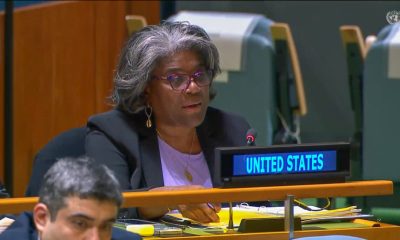‘Not Worth the Paper It Is Written On’: US Guts Gaza Resolution
"By striking the call for suspension of hostilities, the resolution will now ensure that Israel's slaughter in Gaza continues," said one analyst.

All Global Research articles can be read in 51 languages by activating the Translate Website button below the author’s name (only available in desktop version).
To receive Global Research’s Daily Newsletter (selected articles), click here.
Click the share button above to email/forward this article to your friends and colleagues. Follow us on Instagram and Twitter and subscribe to our Telegram Channel. Feel free to repost and share widely Global Research articles.
***
Anger at the Biden administration grew late Thursday after the United Arab Emirates circulated a draft U.N. Security Council resolution that omits an earlier version’s call for a suspension of hostilities in the Gaza Strip, a change that could render the text’s demand for an increase in humanitarian aid moot.
The U.S., Israel’s chief ally and arms supplier, has repeatedly delayed a vote on the resolution as it has worked to gut several elements of the text, including an effort to put the U.N. in charge of monitoring humanitarian aid deliveries to the Gaza Strip with the goal of expediting shipments as hundreds of thousands of people starve.
Israel urged the United States—which has veto power at the U.N. Security Council (UNSC)—to oppose the language.
The latest draft requests that the U.N. secretary-general appoint an official “with responsibility for coordinating, monitoring, and verifying” humanitarian relief shipments to Gaza while “consulting all relevant parties.”
The resolution that the Security Council is expected to consider on Friday—barring any last-minute objections—is a far cry from the initial draft, which demanded an “urgent and sustainable cessation of hostilities.” After U.S. objections earlier this week, the text was amended to call for a “suspension” of hostilities.
The latest draft merely backs “urgent steps” to “create the conditions for a sustainable cessation of hostilities.”
“This is disgraceful,” Trita Parsi, executive vice president of the Quincy Institute for Responsible Statecraft, wrote on social media. “Biden has turned the latest UNSC resolution increasingly meaningless. By striking the call for suspension of hostilities, the resolution will now ensure that Israel’s slaughter in Gaza continues.”
This is disgraceful. Biden has turned the latest UNSC resolution increasingly meaningless. By striking the call for suspension of hostilities, the resolution will now ensure that Israel's slaughter in Gaza continues
Biden is effectively running war crimes management for Israel https://t.co/w1cN4BoOgj
— Trita Parsi (@tparsi) December 22, 2023
U.S. President Joe Biden “is effectively running war crimes management for Israel,” Parsi added.
Even with the text dramatically weakened, the U.S. would not commit to voting yes—though a veto seemed increasingly unlikely.
“I won’t share how I will vote, but it will be a resolution—if the resolution is put forward as is—that we can support,” Linda Thomas-Greenfield, the U.S. ambassador to the U.N., told reporters on Thursday after a closed-door Security Council meeting.
Asked whether the resolution would actually have much impact on the ground in Gaza after being so thoroughly watered down, Thomas-Greenfield said that the measure is “not watered down.”
“The draft resolution is a very strong resolution that is fully supported by the Arab group that provides them what they feel is needed to get humanitarian assistance on the ground,” she added.
But aid groups and other observers disputed that characterization and questioned how aid shipments can be increased while Israel continues to relentlessly bombard the Palestinian territory.
“Surging aid without stopping the bombing is a fairytale,” an unnamed official at a humanitarian organization told HuffPost‘s Akbar Shahid Ahmed. “It’s not clear whether this resolution will help achieve either.”
Mohamed ElBaradei, an Egyptian legal scholar and former director-general of the International Atomic Energy Agency, said the “garbled language” on the U.N. role in aid deliveries and omission of a call to suspend hostilities “makes the draft resolution a travesty and not worth the paper it is written on.”
The draft text emerged as the death toll in Gaza surpassed 20,000 and international horror over the territory’s humanitarian crisis grew following the release of a new analysis showing that the risk of famine is growing by the day.
“This is irrefutable proof that Israel’s attacks have decimated Gaza’s already fragile food system so catastrophically that most people are no longer able to feed themselves and their families,” Aleema Shivji, Oxfam’s acting chief executive, said in a statement Thursday. “People are being starved in Gaza. Unless there is an immediate cease-fire and a massive scale-up of humanitarian aid, Gaza risks being pushed into a famine.”
“Those within the international community who have refused to rein in Israel’s military machine and its collective punishment of Palestinians in Gaza today stand shamed and complicit—this scandal is on your watch,” Shivji added.
[From Common Dreams: Our work is licensed under Creative Commons (CC BY-NC-ND 3.0). Feel free to republish and share widely.]
*
Note to readers: Please click the share button above. Follow us on Instagram and Twitter and subscribe to our Telegram Channel. Feel free to repost and share widely Global Research articles.
Jake Johnson is a senior editor and staff writer for Common Dreams.

